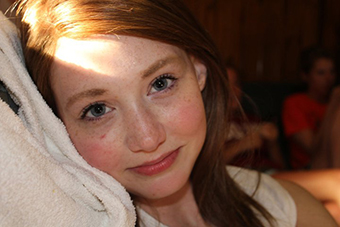1 Million 4 Anna continues support for Ewing sarcoma research

Anna Basso
By Sharon Reynolds
Anna Basso was a fun-loving and compassionate teen who dreamed of becoming an alcohol and drug addiction counselor. However, when she was 16, doctors diagnosed Anna with Ewing sarcoma, an extremely rare, aggressive type of cancer that forms in bone or soft tissue. The cancer had already metastasized throughout Anna’s body, and knowing the enormous battle she faced, her family and friends sent out a call for prayers.
“We reached a million prayers one week before Anna passed away,” said her mother, Carol Basso. “She saw that people were praying for her from all over the world. That touched her. The counting continued after she died, and we eventually reached 7 million prayers. We sincerely hope those prayers were being said for anyone fighting childhood cancer.”
During her treatments, Anna never once stopped living her life and pursuing her goals. She made college visits, attended prom, celebrated her 18th birthday, and received her high school diploma to a standing ovation. Just 10 days after graduation, she passed away. In 2012, Mrs. Basso, her husband, David, and Anna’s older sister, Patrice, fulfilled Anna’s wish to start a foundation to help advocate for all Ewing sarcoma patients and defeat the disease.
“We really didn’t know where the 1 Million 4 Anna Foundation was going to lead us. It started off with a lot of passion of ‘this isn’t right,’” Mrs. Basso said. “There is not enough money for childhood cancer research. Here’s a disease that 80 percent of the diagnoses are between the ages of 10 and 20. There’s no protocol treatment for Ewing sarcoma that has metastasized or relapsed, and only 4 percent of the National Cancer Institute’s research budget goes to childhood cancer research. All of it just didn’t sit well with us.”
The Foundation’s latest gift of $100,000, which brings its total giving to UT Southwestern to more than $600,000, will be used to study targeted therapy and immunotherapy for Ewing sarcoma. Early funding from the Foundation raised the profile for Ewing sarcoma work on the UTSW campus and helped secure grants from both the National Institutes of Health and the Cancer Prevention & Research Institute of Texas (CPRIT).
“The 1 Million 4 Anna Foundation deserves a lot of credit for bringing together scientists on campus who work on Ewing sarcoma,” said Dr. David McFadden, Assistant Professor, Internal Medicine and Biochemistry. “The funding that they gave my lab helped my team generate some of the preliminary data that went into the NIH grant application. When you lose a child, that’s the most sincere motivation anyone could have in life, and they’re trying to make a positive out of that.”
“We are inspired by the courage of families like the Bassos who have overcome tragedy to help relieve suffering for other children,” said Dr. Daniel K. Podolsky, President of UT Southwestern. “Their funding has fueled scientific collaboration on our campus and served as a catalyst to move Ewing sarcoma research forward. We are deeply grateful for the funding they have provided, and their sharing of Anna’s story has motivated others here in Dallas and across the country to focus on this tragic disease.”
The Bassos are driven to fund promising research and believe UT Southwestern is the place to do it.
“We have a cancer that needs better treatments, less toxic therapies, fewer side effects from treatment, and more kids to survive. That’s ultimately our goal. Let’s figure out how to stop this disease in its tracks,” Mrs. Basso said.
|
Ewing sarcoma facts
• About 200 children and teens are diagnosed in the U.S. each year.
• The exact cause is unknown.
• Tumors are highly aggressive and characterized by a mutated EWSR1 gene.
• Treatments include chemotherapy, radiation therapy, surgery, and stem cell transplant.
• Tumors are usually found after signs or symptoms develop. For 1 in 4 children with the disease, cancer will have already metastasized to other parts of the body by the time it is discovered, making the disease more difficult to treat and resulting in significantly lower survival rates.
Source: American Cancer Society
|
Dr. Podolsky holds the Philip O’Bryan Montgomery, Jr., M.D. Distinguished Presidential Chair in Academic Administration, and the Doris and Bryan Wildenthal Distinguished Chair in Medical Science.